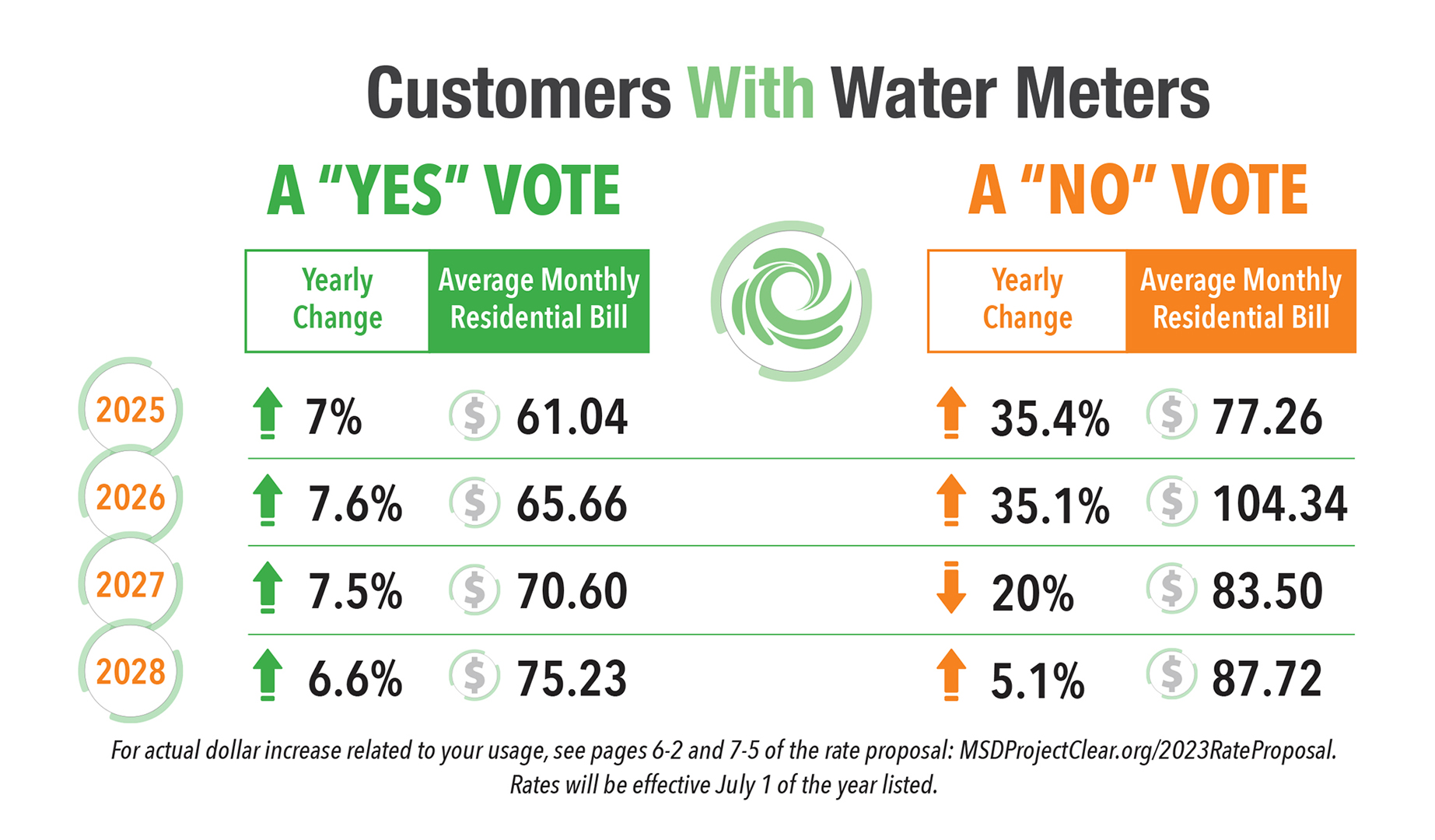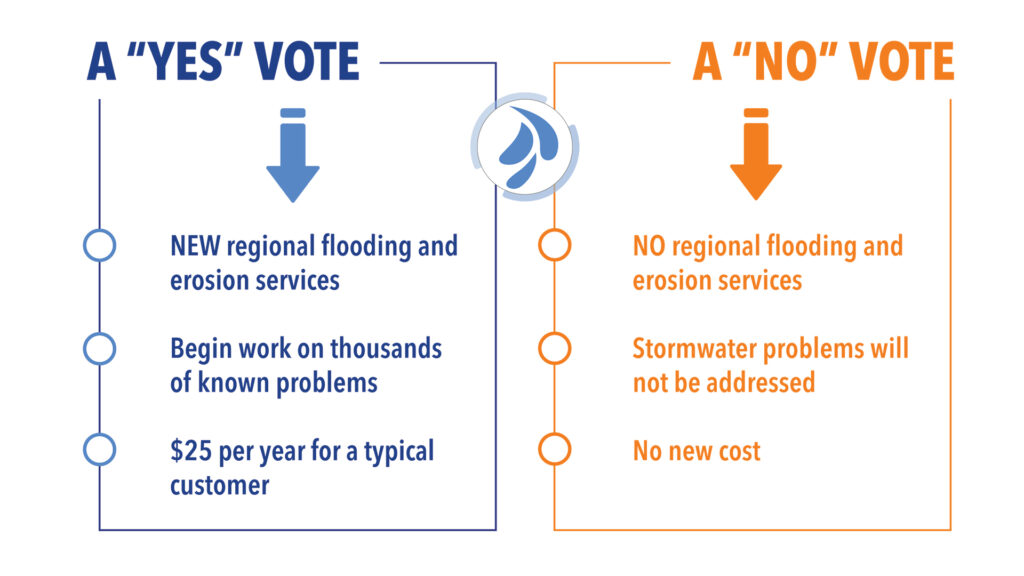On April 2, 2024, customers of MSD Project Clear in St. Louis City and County will decide two important ballot issues, one for wastewater and one for stormwater. MSDPC protects the public’s health, safety, and water environment by responsibly managing both wastewater and stormwater. The St. Louis region’s water management problems continue to change, fueled by more frequent, more powerful storms due to climate change. These challenges, along with funding differences are causing the success of these programs to diverge—wastewater for the better, stormwater for the worse.
Proposition W will determine how wastewater services will be funded over the next four years, while Proposition S would create the first regional program to address growing stormwater problems like flooding and erosion in St. Louis City and County.
To educate voters about Propositions W and S, MSD Project Clear is hosting two virtual and six in person meetings throughout the region. Everyone is encouraged to attend one of these meetings to learn more about these ballot issues. The links for the virtual meetings can be found at MSDProjectClear.org/ballot. The full list of meetings is below.
PROPOSITION W: A Vote on How to Fund the Next Round of Wastewater Improvements
Much of St. Louis’ wastewater system is over one hundred years old including hundreds of miles of sewers built before 1890. Proposition W is a response to MSDPC’s agreement with the Environmental Protection Agency and the Missouri Coalition for the Environment to make $7.2 billion in improvements to the region’s wastewater system over 28 years, bringing it into full compliance with the Clean Water Act. This program began in 2012, and bond issues similar to Proposition W, approved by voters 2012, 2016, and 2021, have helped fund more than 650 system improvements, eliminated 85% of untreated sewage overflows into the environment, and reduced basement backups by one quarter. Further improvements must be done as part of the federal agreement, so Proposition W again asks voters how they want to fund the next round of upgrades.
PROPOSITION W will decide whether MSDPC will issue bonds, borrowing part of funds needed for the next four years of required wastewater system improvements. This work protects more households from sewage backups and more untreated sewage from entering creeks and streams, so this question gives voters two options how they want to fund these improvements.
- A “YES” vote on Prop W allows MSDPC to sell bonds and spread out the cost of the work. Like a home loan, it means you pay less now, but more over the long term. Monthly bills will rise an average of 7% if voters approve Prop W.
- A “NO” vote on Prop W means MSDPC will pay for the improvements entirely through current revenues. This will result in steeper monthly rate increases, as much as 35% in some years ahead if voters reject Prop W. Although rates rise much higher initially, the work will cost less in the long term.

PROPOSITION S: A Regional Approach to Flooding and Erosion
PROPOSITION S would address the region’s sharply rising number of stormwater problems. Voters will decide whether they want MSDPC to address flooding and erosion problems being fueled by climate change. There is currently no funding for these regional improvements.
- A “YES” vote on Prop S allows MSDPC to begin addressing more than 7,000 known flooding and erosion problems reported to the District by residents throughout St. Louis City and County. The average customer will pay $25 per year in additional property tax if voters approve Prop S.
- A “NO” vote on Prop S means MSDPC will not provide new stormwater services to address regional flooding and erosion problems. Customers will pay no additional costs.
 More information about Props W and S on the April 2 ballot is available at MSDProjectClear.org/ballot.
More information about Props W and S on the April 2 ballot is available at MSDProjectClear.org/ballot.
Public Meeting Schedule
Tuesday, March 19 from 6:00 – 7:00 p.m.
Virtual – Zoom
Wednesday, March 20 from 6:00 – 7:00 p.m.
St. Louis County Library Florissant Valley Branch – Meeting Room 1
195 South New Florissant Road, Florissant MO
Thursday, March 21 from 6:00 – 7:00 p.m.
St. Louis County Library Cliff Cave Branch – Meeting Room 1
5430 Telegraph Road, St. Louis MO
Monday, March 25 from 10:00 – 11:00 a.m.
Virtual – Zoom
Monday, March 25 from 6:00 – 7:00 p.m.
Richmond Heights City Hall – Council Chambers
1330 South Big Bend Boulevard, Richmond Heights MO
Tuesday, March 26 from 6:00 – 7:00 p.m.
Chesterfield City Hall – Council Chambers
690 Chesterfield Parkway West, Chesterfield MO
Wednesday, March 27 from 6:00 – 7:00 p.m.
Fenton City Hall – Board Room
625 South New Smizer Mill Road, Fenton MO
Thursday, March 28 from 6:00 – 7:00 p.m.
Metropolitan St. Louis Sewer District – Room 109
2350 Market Street, St. Louis MO



